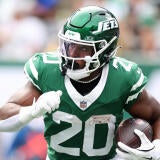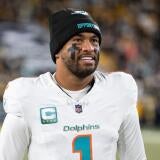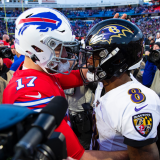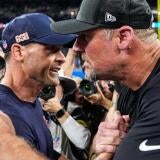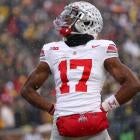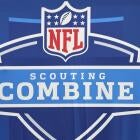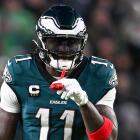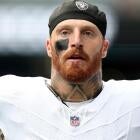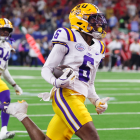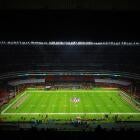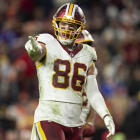
Bears 'all in on' Justin Fields, but here's how Chicago's moves compare to recent teams with second-year QBs
If they're trying to build around Fields, it's not apparent

New Bears general manager Ryan Poles said Friday that the team is "all in on" second-year quarterback Justin Fields. It's no wonder, considering Chicago just one year ago traded up to select the Ohio State product No. 11 overall. But there's a reason Poles had to confirm as much: the team's actions this offseason haven't necessarily catered to the young signal-caller. The new Bears regime will tell you there is more than one way to build a team and develop a franchise QB, but if you're still skeptical they built an adequate supporting cast for Fields in 2022, recent history suggests your concerns are valid.
In the last three years, 2022 included, there have been 14 instances of young drafted QBs entering their second seasons with starting experience, and as unquestioned starters. Regardless of Fields' own imperfections as a prospect, it's very possible he will enter 2022 having gotten the least help -- and the worst projected offensive lineup -- among all 14.
Here's a look at how his fellow young QBs have been aided offensively by their respective clubs:
| Season | QB | Team | Notable veteran additions | Notable draft picks |
|---|---|---|---|---|
2022 | Justin Fields | Bears | WR Byron Pringle, WR Equanimeous St. Brown, TE Ryan Griffin | WR Velus Jones Jr. |
2022 | Jaguars | WR Christian Kirk, WR Zay Jones, TE Evan Engram, OG Brandon Scherff | N/A | |
2022 | Patriots | WR DeVante Parker, OT Trent Brown | OG Cole Strange, WR Tyquan Thornton | |
2022 | Jets | TE C.J. Uzomah, TE Tyler Conklin, OG Laken Tomlinson | RB Breece Hall, WR Garrett Wilson | |
2022 | Texans | RB Marlon Mack, WR Chris Conley, C Justin Britt, OG A.J. Cann | OG Kenyon Green | |
2021 | Bengals | N/A | WR Ja'Marr Chase, OT Jackson Carman | |
2021 | Chargers | TE Jared Cook, C Corey Linsley, OG Matt Feiler | OT Rashawn Slater, WR Josh Palmer | |
2021 | Dolphins | WR Will Fuller, C Matt Skura | ||
2021 | Eagles | N/A | WR DeVonta Smith, OL Landon Dickerson | |
2020 | Giants | N/A | ||
2020 | Cardinals | N/A | ||
2020 | Washington | N/A | ||
2020 | Broncos | RB Melvin Gordon, OG Graham Glasgow | WR Jerry Jeudy, WR K.J. Hamler, C Lloyd Cushenberry | |
2020 | Jaguars | RB Chris Thompson, TE Tyler Eifert | WR Laviska Shenault |
We're not comparing apples to apples here. As these moves are entirely on offense, they don't account for justified investments on the other side of the ball; Chicago, for example, made two enticing additions to its defense in Kyler Gordon and Jaquan Brisker via this year's draft, just as, say, the 2020 Giants went heavy on defense during Daniel Jones' second year. Some teams' additions may also appear only marginally more impressive than those of the Bears; the Patriots, for example, aren't necessarily getting rave reviews for making DeVante Parker the "shiny new weapon" for Mac Jones.
This, however, is where the context of each team's supporting cast comes in. The Patriots also have Damien Harris, Jakobi Meyers, Kendrick Bourne and Hunter Henry as skill-position starters. The Bengals entered 2021 with Burrow set to throw not only to Chase, but Tee Higgins, Tyler Boyd and C.J. Uzomah. The Chargers' lineup already included Austin Ekeler, Mike Williams and Keenan Allen. The Eagles had Miles Sanders, Zach Ertz, Dallas Goedert and a Super Bowl-tested offensive line. The Cardinals already had Kenyan Drake, Larry Fitzgerald and Christian Kirk when they added Hopkins in 2020.
The Bears? Their projected offensive lineup, for Fields' sophomore season, is as follows: RB David Montgomery, WR Darnell Mooney, WR Byron Pringle, WR Velus Jones Jr., TE Cole Kmet, LT Teven Jenkins, LG Cody Whitehair, C Lucas Patrick, RG Dakota Dozier, RT Larry Borom. Perhaps it'll be an improvement on their 2021 squad, which went 6-11 as the Matt Nagy regime sputtered to the finish line. Perhaps new coordinator Luke Getsy will allow Fields to utilize his dual-threat athleticism. Perhaps new coach Matt Eberflus will keep the defense feisty. But it's awfully hard to look at the guys directly around Fields and believe the Bears a.) are serious about putting the QB in the best position for 2022, or b.) came even close to doing just that.
It's not a money issue, either; the Bears currently own more than $16 million in salary cap space, with a league-leading $117.6 million projected available in 2023. That may well mean Poles and Co. are simply gearing up for a Jets- or Jaguars-level spending spree next offseason. By then, however, they will be halfway through Fields' rookie deal -- and one year closer to the deadline for exercising the QB's fifth-year option.
It's possible Fields' own talent will lift the Bears above expectations in 2022. It's possible (but unlikely) Chicago has a blockbuster addition waiting up its sleeve. It's possible they'll still be competitive for other reasons. But if Bears fans gripe about their team failing to properly help their star young QB take a step forward, let them. In the end, the QB and the supporting cast must both contribute to the man under center going from hopeful to confirmed face of the franchise. It's safe to say, at this juncture, Fields has a taller task than some of his peers in terms of making that leap.



